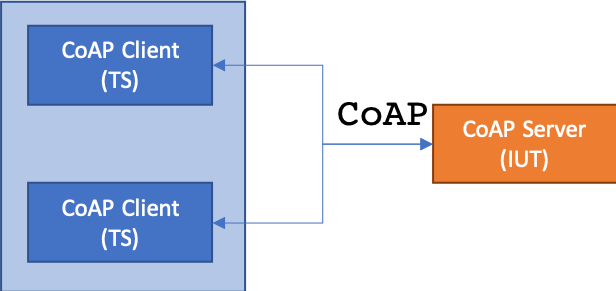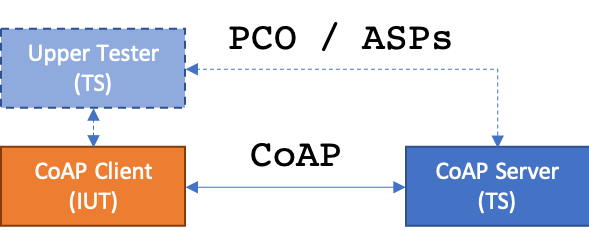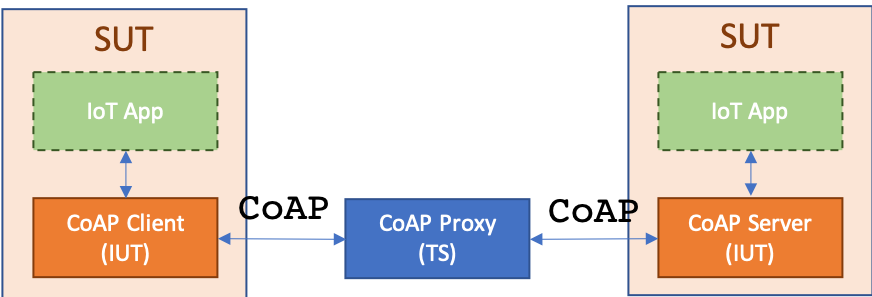CoAP Test Suite¶
Contents
CoAP Protocol¶
- CoAP is a specialized Internet Application Protocol for constrained devices, as defined in RFC 7252
- The Constrained Application Protocol (CoAP) is a specialized web transfer protocol for use with constrained nodes and constrained (e.g., low-power, lossy) networks. The nodes often have 8-bit microcontrollers with small amounts of ROM and RAM, while constrained networks such as IPv6 over Low-Power Wireless Personal Area Networks (6LoWPANs) often have high packet error rates and a typical throughput of 10s of kbit/s. The protocol is designed for machine- to-machine (M2M) applications such as smart energy and building automation.
Note
We provide an annotated version of the official RFC which can be directly referenced (e.g. [CoAP-3.0-3] or [CoAP-3.0-4])
Test Configurations¶
The concrete CoAP test configurations are listed below:
| ID: | CoAP_Conf_01 |
| Description: | The CoAP Server is the IUT and the TS takes the role of a CoAP Client |

| ID: | CoAP_Conf_02 |
| Description: | The CoAP Server is the IUT and the TS takes the role of multiple CoAP Clients. |

| ID: | CoAP_Conf_03 |
| Description: | The CoAP Client is the IUT and the TS takes the role of a CoAP Server. For this configuration an optional UT might be required. |

| ID: | CoAP_Conf_04 |
| Description: | As well the CoAP Server as the CoAP Client, each is a IUT in this configuration. The part of the UT from the previous configuration is here replaced by a concrete application. |

Test Purposes¶
TODO: link to .tplan2 from GitHub and .pdf from ETSI
1 2 3 4 5 6 7 8 9 10 11 12 13 14 15 16 17 18 19 20 21 22 23 24 25 26 27 28 29 30 31 32 33 | Test Purpose {
TP Id TP_CoAP_MessageFormat_Header_Version_001
Test objective
"The IUT is responding on a correctly set version number."
Reference
"RFC7252#section-3", "https://tools.ietf.org/html/rfc7252#section-3",
"RFC7252#section-4.1", "https://tools.ietf.org/html/rfc7252#section-4.1",
"RFC7252#section-4.2 (b)", "https://tools.ietf.org/html/rfc7252#section-4.2"
PICS Selection PIC_Server
Expected behaviour
ensure that {
when {
the IUT entity receives a request message containing
version indicating value 1,
msg_type indicating value 0, //Confirmable
token_length indicating value 0,
code indicating value 0.00, //Empty Message
msg_id corresponding to MSG_ID1;
} then {
the IUT entity sends a response message containing
version indicating value 1,
msg_type indicating value 3, //Reset
token_length indicating value 0,
code indicating value 0.00, //Empty Message
msg_id corresponding to MSG_ID1;
or the client entity times_out //from section 4.2 (b)
}
}
}
|
Test System¶
TODO: describe Test System -> TTCN-3 code
Test Cases¶
You can find all CoAP Tests on GitHub.
testcase TC_COAP_SERVER_001() runs on MTC_CT
{
map(self:p, system:p);
f_TC_COAP_SERVER_001();
unmap(self:p, system:p);
}
Test Case Functions¶
TODO: describe a CoAP Test Case Function
function f_TC_COAP_SERVER_001() runs on MTC_CT
{
f_sendMessage(m_coapPingMessage);
f_receiveMessage(m_coapEmptyMessage);
}
Translation Port¶
TODO: Explain translation port
Generic Functions¶
TODO: describe MQTT_Functions module
Test Templates¶
TODO: describe templates
Default Behaviours¶
TODO: describe the default behaviours
See also
- CoAP Plugtests 1: Guide
- ETSI CTI Plugtests Guide (First Draft V0.0.16 2012-03) for achieving interoperability
- CoAP Plugtests 1: Report
- The 1st CoAP Plugtest was held from 24 to 25 March 2012 in Paris, France and was co-located with IETF#83. This event was jointly organized by ETSI, IPSO Alliance and the FP7 Probe-IT project1.